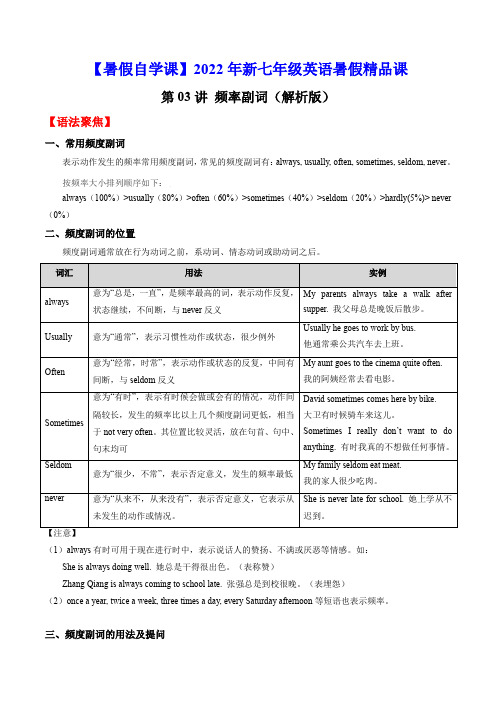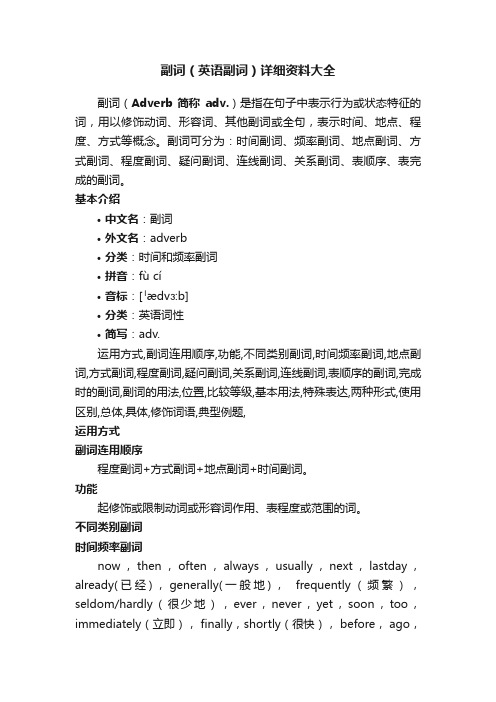Lecture Three 副词
英语副词讲义

副词一、副词定义:副词是一种用来修饰动词、形容词、全句的词,说明时间、地点、程度、方式等概念的词。
副词是一种半虚半实的词。
二、副词的分类:副词可分为:时间副词、地点副词、方式副词、程度副词、频度副词、焦点副词、疑问副词和连接副词。
副词连用顺序:程度副词+方式副词+地点副词+时间副词。
1、时间副词(1)、常见的时间副词now(现在;立刻;目前;马上;其时;当时) then(当时;那时;接着;于是;然后;还有;而且;那么;因此)soon(不久;即刻;马上;宁可;;宁愿) ago(以前)recently (最近;近来)lately(近来;最近;不久前)later(较晚地;后来)finally(最后;终于;完全地)before(先前;从前;以前)early(早;先;在初期;在早期)today (今天)tomorrow(明天)yesterday(昨天)tonight(今晚)suddenly(意外地;忽然;冷不防)immediately(即刻;马上;直接地) already(已经)just(刚刚)等。
(2)、时间副词在句中的位置○1、表确定时间的副词(如today, yesterday等)通常位于句末,有时也位于句首:He went home yesterday. / Yesterday he went home. 他昨天回家了。
○2、表示非确定时间的副词(如soon, recently, suddenly等)除可用于句末或句首外,还可位于句中(通常位于实义动词之前,动词be、助动词、情态动词之后):He went to Paris recently. / He recently went to Paris. / Recently he went to Paris.最近他去了巴黎。
○3、still, already, just 等几个表示时间的副词通常位于句中(实意动词之前,动词be、助动词、情态动词之后):He’s just left for school. 他刚刚去学校。
Lecture 3 翻译的标准

Lecture 3 翻译的标准翻译标准:目前翻译界普遍接受的,也是作为一般翻译学习者必须努力掌握的标准,简而言之是两条:忠实(Faithfulness) 和流畅(Smoothness)。
外语腔是初学翻译者不知不觉地会在汉语译文中表现出来的一种不当倾向。
翻译时所要表达的内容来自外语原文,原文的词语和结构形式随着内容一起进入到我们的大脑,于是原文的语言形式被带入译文,造成了译文的外语腔。
The only concession he made to the climate was to wear a white dinner jacket.【译文】气候变化,他仅稍稍作了一点变通,赴宴时穿了件白色的短礼服。
翻译标准:忠实和流畅好的译文还必须保持原文的风格包括民族风格、时代风格、语体风格、作者个人的语言风格等。
即:译者不能破坏或改变原文的风格,不能以译者的风格代替原作的风格。
课堂练习:•She couldn't have come at a better time.•She has been a widow only six months.•I believe the speech was needlessly stubborn.•The Englishman feels no less deeply than any other nationality.•From a physical standpoint, there ought to be as many colours as there are different wave lengths.•As a human being, we should demonstrate our intellectual and moral superiority by respecting others for who they are -- instead of rejecting them for who/what they are not.1. 她来得正是时候。
Lecture Three

主从复合句通常在连接从句处切分, 分成两个句子翻译
4. One day, while out on the bleak moors, Pip is startled by a hulking, menacing man who threatens him if he does not bring him some food immediately. 匹普外出在阴冷的荒原上游荡时,一个魁梧,凶狠 的男子把他吓了一跳.这个男子威胁他,让他立即 为他送些食物来.(在who引导的从句前切分)
3.句子分译 句子分译
句子分译就是把原文的一句话译成两句或两 句以上.汉语句子结构松散,英语句子结构 严谨.汉语句子逻辑关系往往很不明显,而 英语句子结构往往通过使用连词很明确的表 现出来.
3.句子分译(英译中) 句子分译(英译中) 句子分译
1.Daybreak comes with thick mist and drizzle. 黎明时分,大雾弥漫,细雨蒙蒙.(简单句 分译)
2. The entire cable-car system recently got an overhaul after more than a century of operations, so you are on firm ground even if the streets seem to be tilting beneath you. 在运行了一个世纪之后,最近对整个缆车系 统进行了彻底检修.所以即使你觉得街道似 乎在下面倾斜,你在缆车上仍很安全.(并 列复合句)
4.I found the house suddenly, and stood there with my heart beating fast and tears coming to my eyes. 我突然找到那所房子. 我站在那里,心剧 烈地跳着,泪水也涌上眼睛. (并列分句)
既是形容词也是副词的英语单词

既是形容词也是副词的英语单词第一篇:既是形容词也是副词的英语单词(一)late/lately late 意为“迟,晚”,置于句末或动词后。
He goes to bed late and gets up tely 意为“近来,最近”,相当于 recently,可置于句首也可置于句末。
Lately I've collected a lot of foreign stamps.(二)pretty/prettily pretty 与 rather,very 相近,意为“相当,十分”。
It's pretty cold outdoors today.prettily 意为“漂亮地,有礼貌地”。
She was prettily dressed at the party.(三)hard/hardly hard 意为“努力地,猛烈地”。
It is raining hard.hardly 意为“几乎不,简直不”,常置于行为动词前或情态动词、助动词、系动词之后。
I was so tired that I could hardly walk.(四)new/newly new 作副词一般用在某些合成词中,常与过去分词构成合成形容词,两个词之间有连字符。
a new-born babya new-laid eggnewly 意为“新近地”,一般用于修饰过去分词,中间无连字符。
They are a newly married couple.Don't sit on the newly painted chair.(五)easy/easily easy 作副词意义和 easily 相同,但它仅用于某些惯用语中。
如: Take it easy.别着急。
Easy come,easy go.来得容易,去得快。
Easier said than done.说来容易做来难。
Stand easy!稍息!Easily 意为“容易地,轻松地,随便地”。
英语形容词和副词的用法讲解

Foreign Language Department COCO
2) late 与lately late意思是“晚”; lately 意思是“最近” You have come too late. What have you been doing lately ? 3) deep与deeply deep意思是“深”,表示空间深度;deeply时 常表示感情上的深度,“深深地” He pushed the stick deep into the mud. Even father was deeply moved by the film.
Foreign Language Department COCO
4.5 副词及其基本用法
副词主要用来修饰动词,形容词,副词或其他 结构。 一、副词的位置: 1) 在动词之前。 2) 在be动词、助动词之后。 3) 多个助动词时,副词一般放在第一个助动 词后。 注意:
Foreign Language Department COCO
Foreign Language Department COCO
4)要注意冠词的使用,后有名词的时候,前 面才有可能有名词。 比较:Which is large, Canada or Australia? Which is the larger country, Canada or Australia? She is taller than her two sisters. She is the taller of the two sisters.
Foreign Language Department COCO
中考英语语法-形容词和副词

形容词的顺序
P72-[1]-b 补充
一些特别说明:
2. 如果有名词作定语,名词要靠近被修饰词
a white cotton shirt
a new government policy
白棉布衬衫
政府的新政策
现在你明白了为什么材料放最后了吗?
形容词的顺序
P72-[1]-b 补充
一些特别说明:
3. 说明主观看法的词要比客观的离被修饰词远一些
generally unfortunately
often
seldom
副词的用法及位置
1. 副词修饰动词
P76-[2]-a
vt. 位于宾语之后
副词的位置
vi. 位于之后 如果有介宾结构,则位于介宾之后。
副词的用法及位置
P76-[2]-a 补充
1. 副词修饰动词
She has a __g_o_o_d__ voice. She sings __w__e_ll__.
Skydiving or Parachuting
让我们来看一道全国高考题
形容词充当的成分
P71-[1]-a 补充
2008年全国高考
After the long journey, the three of them went back home, _______.
A. hungry and tiredly
B√. hungry and tired
一般修饰词都放在形容词或副词前面。
副词的用法及位置
2. 副词修饰副词或形容词
P76-[2]-b
Sky-diving is _a_n_e_x_t_re_m__e_ly__d_a_n_g_e_ro_u_s_ _an_d__e_x_c_it_in_g_ sport.
英语副词的分类及用法

英语副词的分类及用法一、副词的识别和用法副词在句子中作状语,用来修饰动词、形容词、副词本身或者整个句子。
我们可以通过以下方式来识别副词。
1、以-ly结尾的单一副词。
很多副词由“形容词+ly”构成,如carefully, successfully但要注意的是,“名词+ly”构成的是形容词,如friendly, brotherly, lovely, manly等。
2、在形容词、副词或者介词短语前。
有些副词并不是由加-ly构成的,如often, fast, there, then, very, quite, perhaps等,识别的办法是:如果它们置于形容词或副词前,便可断定是副词。
例如:She asked teachers for advice on her lessons very often. (在副词前)她经常就学习向老师请教。
Generally, our experiment was quite successful.(在形容词前)总的说来,我们的试验相当成功。
Much to my surprise, the cat came to life three days later.(在介词短语前)使我非常惊奇的是,这只猫三天后又活过来了。
3、在动词前或者后面。
修饰动词时,副词常置于动词前,有时也可后置。
例如:We drove slowly on the muddy road.我们在泥泞的路上缓慢地行驶。
4、单独置于句子之首,或者插在句子中间。
单个的词用逗号与句子隔开时,这个词多半是副词,作状语修饰整个句子。
例如:Fortunately, I was absent from the house when the earthquake occurred.幸运的是,地震发生时我不在家。
二、副词的分类1、方式副词。
多由形容词加-ly构成,例如patient / patiently, mad / madly, sudden / suddenly;也包括由-l结尾的形容词,此时l要双写,如beautiful / beautifully;一些介词短语也可以作方式状语。
第03讲频率副词(学生版+解析)-【暑假衔接】新七年级英语暑假精品课(牛津译林版)

【暑假自学课】2022年新七年级英语暑假精品课第03讲频率副词(解析版)【语法聚焦】一、常用频度副词表示动作发生的频率常用频度副词,常见的频度副词有:always, usually, often, sometimes, seldom, never。
按频率大小排列顺序如下:always(100%)>usually(80%)>often(60%)>sometimes(40%)>seldom(20%)>hardly(5%)> never (0%)二、频度副词的位置频度副词通常放在行为动词之前,系动词、情态动词或助动词之后。
词汇用法实例always 意为“总是,一直”,是频率最高的词,表示动作反复,状态继续,不间断,与never反义My parents always take a walk aftersupper. 我父母总是晚饭后散步。
Usually意为“通常”,表示习惯性动作或状态,很少例外Usually he goes to work by bus. 他通常乘公共汽车去上班。
Often 意为“经常,时常”,表示动作或状态的反复,中间有间断,与seldom反义My aunt goes to the cinema quite often.我的阿姨经常去看电影。
Sometimes 意为“有时”,表示有时候会做或会有的情况,动作间隔较长,发生的频率比以上几个频度副词更低,相当于not very often。
其位置比较灵活,放在句首、句中、句末均可David sometimes comes here by bike.大卫有时候骑车来这儿。
Sometimes I really don’t want to doanything. 有时我真的不想做任何事情。
Seldom意为“很少,不常”,表示否定意义,发生的频率最低My family seldom eat meat. 我的家人很少吃肉。
副词讲解

soon, quickly, 等等.
中考英语专项复习
形容词和副词
副词根据所表达的不同意义可将其分 为以下几种: 1、时间和频度副词:now, then, often, always, early, today, already, soon, ago, yesterday等. 2、地点副词:here, there, everywhere, out, in, home, upstairs, above, below, inside等. 3、方式副词:carefully, politely, fast, well, extremely, anxiously等.
中考英语专项复习
形容词和副词
4、程度副词:much, little, very, rather, too, rather, almost, so等. 5、疑问副词:how, where, when, why (放在特殊疑问句前) 6、关系副词:when, where, why(通常 引导宾语从句) 7、连接副词:how, when, where, why, whether(通常引导定语从句)
Jim jumped (the) highest of the all.
注意:1、副词very可以修饰形容词、副词, 中考英语专项复习 形容词和副词 但不能修饰动词。例如: This flower is very beautiful. I like English very much. (但不能说:I very like English.) 2、enough作副词时,用在形容词、副词之 后;enough用作形容词时,放在名词前或 后都可以。 例如:He is strong enough to lift the heavy box. The man has got enough money (or: money enough) to buy a car.
Lecture 3 英语写作句式变化:短句变长句

句子扩展黄金原则: 拉长主谓宾,加上定状补
例:I love you. I, ,love you. I, ,love you . I, , love you
.
I, with all my heart and soul, which is never going to change until the end of the time, love you , whose eyes are filled with love and encouragement , which has supported me all the way here ,truly , Mom.
练习长句改造
1.The officials have built highways. (5 个 单词) 添加时间状语 添加定语修饰语 添加补充说明成分
第一种写法:
In the recent years(加时间状语) the responsible and warm-hearted officials a great number of highways(两个形容词短 语) connecting some lonely areas.(加现在分词
第二个,Undoubtedly,毫无疑问。 练习:毫无疑问,政
Undoubtedly, the government should lead citizens to stand by the new law on public transportation.
七类神句(二)句首状语
第一个,unfortunately,不幸的是。 四六级作文经常围绕“社会问题”出题, 所以你首 先要学会"摆事实'‘,陈列“社 会弊端”。 练习:不幸的是,相当一部分成年人不 愿意承担赡养他们年迈父母的责任。 Unfortunately, a large number of adults are unwilling to take the responsibility of supporting their aged fathers and mothers.
六级听力-Lecture

讲座/讲话听力
B 词与词替换(同义词或者反义词替换) 比如:interesting = stimulating;fascinating;exciting;not boring You can take your time. 不着急。 There's no rush. What's the rush?
讲座/讲话听力
◇听前: 1 快速阅读选项; 2 预测内容和题型 ◇听中: 1 理解大意,抓住主题; 2 注意小词和短语 ◇听后: 1 选择相近的选项; 2 争取去找对立的选项
讲座/讲话听力
Lecture 八种常见题型 1、小故事题型 主要类型:幽默故事、奇闻轶事 三个考点: (1)首三句 :交待故事背景以及主人公遇到什么问题 (2)主人公做出了什么样的计划决定以及原因 (3)故事往往会以非常生动的结局收尾,通常主人公做了出人意料的举动或说了 意味深 长的话,假设学生走进英语国家的大学课堂,你是否能听懂 真正的外国教授的英文授课,这种题型的设计更加接近于托福考试中的lecture, 命题设计也和托福考试十分相似,其出题点在于: 1.段首段尾句:任何一个篇章第一句话往往是重点 2.设问句:一般疑问听升调,特殊疑问听特殊疑问词(5w+1h) 3.总结性质的词汇:in brief, in particular, in short, all in all, generally speaking, conclude, conclusion, in a word, so , you see, in fact, we can say, ok, anyway
讲座/讲话听力
【题型解读】 新六级的讲座/讲话听力素材来源比较复杂,有的来自托福原题,有的来自 VOA或者BBC等国外新闻媒体,最长的原文字数将近达到了450词。 讲座/讲话听力题型的内容往往会比较专业,但是在形式上,由于是演讲内容, 很多时候更偏向于口语表达。这类题型同样有着特定的行文方式和风格,考生 需要靠日常多积累,多练习,方能轻松应对。
比较级最高级

a.直接加-est. 如:short--shortest small--smallest b. 以-e 结尾的形容词,最高级+ -st。如:
large—largest nice—nicest cute—cutest c. 以辅音字母+y结尾的形容词,变y为i +est。 busy—busiest heavy—heaviest easy—easiest happy—happiest dirty—dirtiest
比较级最高级
It is applicable to work report, lecture and teachingΒιβλιοθήκη Grammar Focus
(二)形容词的比较级和最高级 comparatives and superlatives with adj. and adv.
delicious – more delicious interesting – more interesting important— more important carefully---more carefully quickly---more quickly slowly---more slowly easily--- more easily
important—more important
carefully---more carefully quickly---more quickly slowly---more slowly easily--- more easily
形容词最高级的构成
A: tall short
taller tall
最高级” 的结构表示。这种句式一般带有表 示比较的介词短语,比如: in our class, of the three 等。 例如:Wang Lin is the tallest in our class.
高中英语常用词汇辨析

中学英语常用词汇辨析中学英语常用词汇辨析1. clothes, cloth, clothingClothes统指各种衣服,谓语动词恒久是复数:cloth指布,为不行数动词:clothing为服装的总称,指一件衣服用a piece of clothing, an article of clothing2. incident, accidentIncident指小事务:accident指不幸的事故3. amount, numberAmount后接不行数名词:number后接可数名次:如:a number of students 4. family, house, homeHone家,包括住处和家人:house房子,住宅:family家庭成员,如:My family is a happy one.5. sound, voice, noisesound自然界各种各样的声音:voice人的嗓音:noise噪音,如:I hate the loud noise outside.6. photo, picture, drawingPhoto用照相机拍摄的照片:picture可指相片,图片,电影片:drawing指画的画7. vocabulary, wordVocabulary词汇,一个人拥有的单词量:word详细的单词8. population, peoplePopulation人口,人数:people详细的人9. weather, climateWeather一天内详细的天气状况:climate长期的气候状况10. road, street, path, wayroad详细的马路,马路:street街道:path小路,小径:way道路,途径11. course, subjectCourse课程(可包括多门科目):subject科目(详细的学科),如: a summer course12. course, habitcustom传统风俗,习俗,也可指生活习惯,后接to do: habit生活习惯,习惯成自然,后接of doing13. cause, reasoncause制造成某一事实或现象的干脆缘由,后接of sth./doing sth.: reason 用来说明某种现象或结果的理由,后接for sth./doing sth. 如:the reason for being late14. exercise, exercises, practiceExercise运动,熬炼(不行数):exercises练习(可数):practice(反复做的)练习,如:Practice makes perfect.15. class, lesson作“课”解时,两者可以替换。
副词(英语副词)详细资料大全

副词(英语副词)详细资料大全副词(Adverb 简称adv.)是指在句子中表示行为或状态特征的词,用以修饰动词、形容词、其他副词或全句,表示时间、地点、程度、方式等概念。
副词可分为:时间副词、频率副词、地点副词、方式副词、程度副词、疑问副词、连线副词、关系副词、表顺序、表完成的副词。
基本介绍•中文名:副词•外文名:adverb•分类:时间和频率副词•拼音:fù cí•音标:[ˈædvɜ:b]•分类:英语词性•简写:adv.运用方式,副词连用顺序,功能,不同类别副词,时间频率副词,地点副词,方式副词,程度副词,疑问副词,关系副词,连线副词,表顺序的副词,完成时的副词,副词的用法,位置,比较等级,基本用法,特殊表达,两种形式,使用区别,总体,具体,修饰词语,典型例题,运用方式副词连用顺序程度副词+方式副词+地点副词+时间副词。
功能起修饰或限制动词或形容词作用、表程度或范围的词。
不同类别副词时间频率副词now,then,often,always,usually,next,lastday,already(已经),generally(一般地),frequently(频繁),seldom/hardly(很少地),ever,never,yet,soon,too,immediately(立即), finally,shortly(很快), before, ago,sometimes, yesterday. once,ice, lately,recently,personally,today……yet地点副词here, there, everywhere, anywhere,somewhere, in,out,inside,outside,above,below,up,down,back,forward(向前地),home,upstairs(楼上地),downstairs,across,along,round ,around,near,off,past,up,away,on.……方式副词carefully,properly(适当地),anxiously(焦虑地),suddenly,normally(正常地),fast,well, calmly(冷静地),politely(有礼貌地), proudly(自豪地), softly, warmly ,slowly,badly,hard,bravely……程度副词much,little,very,rather(相当),so,too,still,quite,perfectly(完美地),enough,extremely(非常),entirely(整个),almost, slightly(细小地),hardly.……疑问副词how, when, where,why……关系副词when, where,why……连线副词therefore(因此),moreover(此外),however,otherwise(另外的), then,when ,where,how,why……表顺序的副词first,then,next,finally,afterwards,primarily……完成时的副词already,ever,just,never,since,yet,recently……副词的用法副词在句中可作状语,表语,补语,定语。
lecture 5:形容词和副词

• 7) most / mostly / almost • most : “最”, 修饰形容 词、副词的最高级。 • mostly: “通常”、“在多 数情况下”、 • almost: “几乎”
• This is the most interesting novel I have ever read. • She is mostly out on Sundays. 她星期天通常要外出。 • It was almost dark when they reached there.
• 说明:1)同一类形容词排列时,通常将 较短的词放在前面 • a kind, generous ,old man 一个和蔼的, 慷慨的老人 • 2)两个或几个同类形容词作定语时,可 以用and 连接 • That is a black and white cat. • He is a right and diligent boy. • 3) 形容词并列作表语,通常由and 连接。 • He was tall, dark and handsome.
• ◆all together 意思为“一起”或 “总共”。 • Let’s sing the song all together. 咱们一起来唱这首歌吧。 • All together fifty people have registered. 总共有五十个人登记 了。
• 3)rather / fairly • ◆都作“相当的”,“颇”解,有时可以互换。 • We know him fairly / rather well. 我们相当了 解他。 • ◆有时含义不同:rather 常修饰贬义词,fairly 常修饰褒义词 • Tom is fairly clever, but Peter is rather stupid. • ◆有些形容词或副词本身并不褒贬之意,但用了 rather即表示反感,用fairly 表赞许。 • This soup is fairly hot. 这汤热乎乎的。 • This soup is rather hot. 这汤太烫了。
Unit Three 词性转化

Unit Three 转化在翻译过程中,由于汉语和英语两种语言在语法上和表达习惯上的差异,有时必须改变原来某些词语的词类或句子成分才能有效地传达原文的准确意思。
1.名词的转译Britain has no such natural protection from a flood of Hollywood products.英国没有这种天然的保护来阻挡好莱坞影片的长驱直入。
He is a good eater and a good sleeper.他能吃能睡。
This article aims at discussing new development in component material and techniques.本文的目的在于讨论元件材料和元件技术的新成就。
1.2名词转译为形容词A newly-elected senator is a power,I know that.一个新当选的参议员的确是威风十足,那我是知道的。
Can I be such a villain?难道我能这样伤天害理吗?The young man behaved himself extremely well and is,I believe,a much better gentleman than the girl who abused him.这位年轻人举止十分端正,我相信从人品来说要比侮辱他的那个女孩高贵多了。
1.3名词转译为副词They were sitting on a bank resting the knee and talking of the universe.他们在斜坡上坐着,一面让膝盖休息,一面海阔天空地谈着。
The new mayor earned some appreciation by the courtesy of coming to visit the citypoor.新市长礼貌性地前来访问城市贫民,获得了他们的一些好感。
副词用法详解-适合高三和大学生

Unit4 副词一:副词的意义和用途:1. 修饰动词Paganini played the violin beautifully.2. 修饰形容词very good; awfully hungry.3. 修饰其它副词very soon; awfully quickly4. 修饰介词短语You’re entirely in the wrong.5. 修饰完整的句子Strangely enough, I won first prize.6. 修饰名词The man over there is a doctor.副词可以是单个的词(slowly)也可以是词组(in the garden)往往用“状语”这个术语来称呼。
它不是构成句子的必需成分,但往往会影响句子的意思。
I have finished work.I have nearly finished work. (快完成了)有时,副词是完成一个句子所必需的。
如lie down, sit over there, put the car in the garage.7. 如何识别副词:⑴以-ly结尾的单一副词patiently/usually/nearly,许多观点副词也以-ly结尾,如fortunately.⑵不以-ly结尾的副词,包括与形容词形式一样的方式副词,如fast, there, then, often, perhaps(观点副词), however(连接副词)。
⑶副词短语,表示方式、地点和时间的副词短语常用介词+名词构成,如in a hurry/ in the garden/ at the station; 其它的副词还有again and again (频度), hardly at all (程度副词), very much indeed (thank you very much indeed), as a matter of fact, in that case。
- 1、下载文档前请自行甄别文档内容的完整性,平台不提供额外的编辑、内容补充、找答案等附加服务。
- 2、"仅部分预览"的文档,不可在线预览部分如存在完整性等问题,可反馈申请退款(可完整预览的文档不适用该条件!)。
- 3、如文档侵犯您的权益,请联系客服反馈,我们会尽快为您处理(人工客服工作时间:9:00-18:30)。
方式副词:
She don’t want to accept the man’s present, but she don’t want to hurt his feeling. She refused it gently ____.
They don’t want to solve the problem with violence. They hoped to see it settled ____. peacefully
5. If winter comes, can spring be far behind?
副词
副词的类型
副词的作用
副词的构成 副词的比较级和最高级
副词的类型时间 地点句子方式language
疑问/连接/关系
component
程度/强调
时间副词:发生的时间和频率
你今晚有空吗? Will you be free tonight.
副词比较级和最高级的一些特殊用法
1)more and more 越来越…
I hate him more and more. 翻译:劳动节越来越近了。 The May day is drawing nearer and nearer. 2) the more…the more 越…, 越… The more she thought, the more angry she got.
You can eat free in my restaurant whenever you like.
无论什么时候,我这饭店免费对你开放。
You may speak freely; say what you like.
你可以畅所欲言,想说什么就说什么。
副词的比较级和最高级 1.我越来越讨厌他。 2.她越想越气。 3.你最好别烦她。 4.你应当懂得不要把所有钱都花在买衣服上。 5.他本想和我顶嘴的,但没有这样做。 6.他以前是个花花公子,后来改变了。
calmly冷静地,carefully仔细地,小心地, carelessly粗心地,patiently耐心地,politely礼貌地, proudly自豪地,properly适当地,quickly快速地, rapidly迅速地,suddenly突然,successfully成功地, willingly情愿地,warmly热情地 make sentences
1. Wife talking to her husband (who reads newspaper all day): I wish I were a newspaper so I'll be in your hands all day. Husband: I wish that too, so I could change you daily. 时间副词
1. Wife talking to her husband (who reads newspaper all day): I wish I were a newspaper so I'll be in your hands all day. Husband: I wish that too, so I could change you daily.
副词的构成 1.与形容词同形的副词有:deep ,high, hard, daily, early, fast, near, low , far, little, straight, pretty, enough, only, direct ect.
Memorize it
2. 形容词+ly构成副词 luckily, sadly, happily, naturally…
她老是改变主意。 She is constantly changing her mind.
地点副词:
她在国外留学。
She is studying abroad. 他们搬到城里去了。 They moved downtown.
here这里,there那里,upstairs楼上,downstairs 楼下,anywhere任何地方,above在上方,up上面, down下面,east向东,west向西
2. Fill in the blank
1. My purse was stolen on the bus yesterday. __________ (Fortunate), there was no money in it. 2. Mobile phones are _________ (wide) used in most of the cities in China.
翻译:我对他了解越深就越喜欢他。 The better I knew him, the more I liked him.
3) had better/had best 最好 You had better leave her alone. 翻译:你最好别等他们了。 You had better not wait for them. 4) know better than (to) do something 懂得不 宜做某事
5. If winter comes, can spring be far behind?
副词的作用 1.作状语
1)修饰动词
2)修饰形容词
3)修饰副词
4)修饰句子
1.They listened to the teacher attentively and took notes every now and then. 2. The ticket is terribly expensive.
注意: 名词+ly构成形容词
name some of them
friendly, lovely, lonely, homely, manly, motherly, deadly, ugly, silly, likely, brotherly, timely…
She sang lovely. Her singing was lovely.
2) late 与lately late意思是"晚";lately 意思是"最近" You have come too late. What have you been doing lately?
3) deep与deeply
deep意思是"深",表示空间深度;deeply时常表示感情 上的深度,"深深地"。 她把棍子深深插进泥里。
She pushed the stick deep into the mud.
连老爸都被这电影深深打动了。 Even father was deeply moved by the film.
4) high与highly high表示空间高度;highly表示程度much。 The plane was flying high. 这架飞机飞得很高。 I think highly of your opinion. 你的看法很有道理。
He spoke to me very friendly.
He spoke to me in a very friendly way.
3. 兼有两种形式的副词 1) close与closely close意思是"近";closely 意思是"仔细地" He is sitting close to me. Watch him closely.
Test:
1. Give me some examples or make sentences: 1) name five adverbs of degree
2) name five adverbs of manner 3) use “know better than to do something” to make a sentenc 4) Use “think better of” to make a sentence
2. The worst way to miss someone is to be sitting right beside them knowing you can’t have them. 强调副词
3. Don’t try so hard, the best things come when you least expect them to. 程度副词 4. Can you tell me the reason why you are so unhappy? 关系副词 程度副词 地点副词
程度/强调副词:
perfectly clear awfully sorry utterly unreasonable partly right 十分清楚 非常抱歉 极不合理 对了一点
疑问副词,如:
how, when, where. why 放在特殊疑问句句首。 关系副词,如: when, where, why, whether, 引导定语从句。 连接副词,如: how, when, where, why, whether, 引导名词性 从句。
句子副词:
Honestly, I don’t know. 真的,我不知道。 Surprisingly, she has married again. 令人惊讶的是,她又结婚了。 Seriously now, you ought to take more care of your health. 说真的,你应该多主意身体。
修饰动词, 形容词,副词和句子
1. She is shaking her body crazily. 2. I am slightly faint when I stare at the picture. 3. She is moving too fast. 4. Honestly, I don’t take it as dancing.
